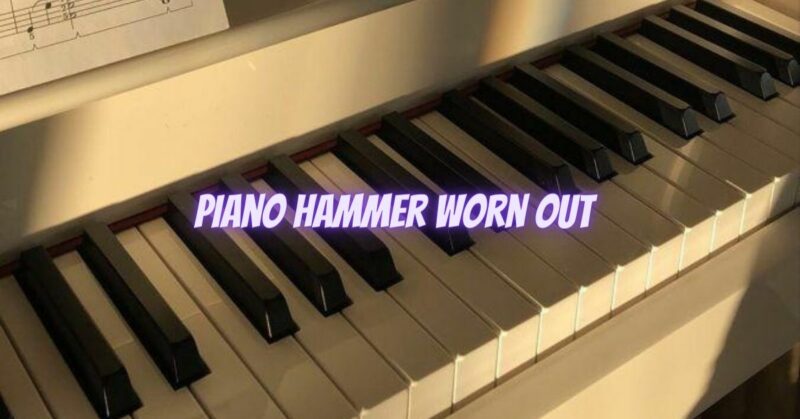The piano hammer is a crucial component responsible for striking the strings to produce sound. Over time, due to extensive use and exposure to environmental factors, piano hammers can wear out, resulting in changes to the instrument’s tone and playability. Recognizing the signs of worn-out hammers is essential to maintaining the piano’s sound quality. Here are some common indications of worn-out piano hammers and steps to address the issue:
Signs of Worn-Out Piano Hammers:
- Muffled Tone: Worn-out hammers lose their felt density, leading to a softer and muffled tone. The piano may sound less vibrant and dynamic.
- Lack of Responsiveness: As hammers wear out, they may become less responsive, requiring more effort to produce a clear sound.
- Grooves and Indentations: Continuous striking of the strings can cause grooves and indentations on the hammer felt. This can lead to uneven tone and poor sound projection.
- Poor Dynamic Range: Worn-out hammers may struggle to produce a wide dynamic range, resulting in limited tonal variation from soft to loud.
- Uneven Tone Across the Keyboard: Different hammers wear at different rates, causing an uneven tonal balance across the keyboard.
Steps to Address Worn-Out Piano Hammers:
- Voicing: Voicing is the process of adjusting and reshaping the hammer felt to achieve a more even tone and dynamic response. A professional piano technician can use special tools like voicing needles and voicing felt to reshape and compact the hammer felt. Voicing can help restore some of the lost tonal qualities of the worn hammers.
- Shaping: If the hammers have grooves or indentations, a technician can carefully shape the felt to remove the imperfections and create a smoother striking surface.
- Hammer Replacement: In severe cases of wear, hammer replacement might be necessary. A skilled piano technician can remove the worn hammers and install new ones, restoring the piano’s original tone and playability.
- Regular Maintenance: To prevent excessive wear on the hammers, it’s essential to perform regular maintenance, including proper humidity control, keeping the piano clean, and scheduling regular tunings and inspections by a qualified piano technician.
- Avoid Excessive Force: Encourage pianists to play with a relaxed touch and avoid excessive force when striking the keys. Hard and forceful playing can accelerate hammer wear.
- Professional Assessment: If you notice any significant changes in your piano’s tone or playability, it’s best to have a professional piano technician evaluate the instrument. They can provide expert advice and recommend the appropriate action to address any issues.
Conclusion:
Worn-out piano hammers can significantly impact the tone and playability of the instrument. Regular maintenance, proper voicing, and timely replacements when necessary are essential to preserve the piano’s original sound and ensure an enjoyable playing experience. By taking care of your piano and seeking professional assistance when needed, you can prolong the life of the hammers and maintain the instrument’s beautiful and expressive sound for years to come.


